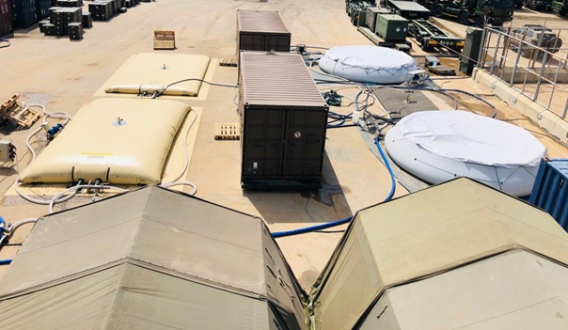Land Army: how to be self-sufficient in drinking water in the field?
Pouvoir disposer de l’eau potable sur le terrain est un enjeu stratégique pour l’Armée de Terre. La station du traitement des eaux mobile (STEM) conçue par EQUANS France avec Suez dans le cadre d’un contrat avec la DGA (Direction Générale pour l’Armement) produit de l’eau potable à partir de l’eau disponible sur le terrain. Explications.

Key figures
Key figures
A system that adapts to all types of water
It took three years to develop the mobile water treatment station, the result of collaborative work between industrial teams and the Ministry of the Armed Forces (DGA, Army, SIMMT), including the Armed Forces Health Service (SSA) and the veterinary services. The station can treat all types of water, brackish or sea water, unapproved water resources and water containing potential sources of uncontrolled pollution. Its major advantage is that it is a very compact system that can be projected onto sensitive sites. The innovative water treatment and control processes used guarantee a very high level of quality.
Innovative processes that meet the needs of the field
The water is first collected from the river and stored in a 20,000 litre tank, in which the raw water pump of the treatment machine is placed. Four stages are then necessary to make the water drinkable. First, it is pumped and sent to the first pre-filters, which remove the thickest suspended matter. Then it passes through ultrafiltration membranes to remove almost all the bacteria. The third operation removes viruses and unwanted particles from the water using the reverse osmosis system. The 4th and final phase consists of passing the osmosis water through cartridges filled with mineral salts necessary for the human body. All the production phases are controlled by a control panel that allows the treatment and quality of the water to be monitored.
Tenfold increase in processing capacity in operation
The STEM plant produces an average of 6m3 of consumable water per hour, four times the volume of its predecessor, the Mobile Water Treatment Unit (MWTU). If seawater is used, its capacity will be reduced to 3m3 per hour. In operation, the number of tanks can be multiplied, thus increasing the raw water storage capacity. Used in the Tarn, the plant produces 20,000 litres of water to supply the drinking water needs of 250 people per day. This innovation makes it possible to produce and distribute drinking water in complete autonomy and safety, from natural sources. Its capacity to supply the drinking water needs of up to 800 people per day.
Partners

Expertise and offers
- Innovation in drinking water treatment
- STEM's reverse osmosis system to ensure complete water purification

